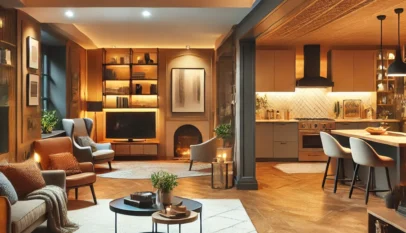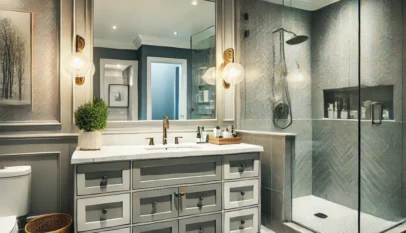
High-end kitchens Toronto reflect a blend of luxury and functionality, catering to homeowners who appreciate quality craftsmanship. These kitchens often feature top-of-the-line appliances, custom cabinetry, and elegant finishes that enhance both aesthetics and usability. The appeal of such spaces lies not only in their beauty but also in their ability to elevate the cooking and entertaining experience.
For those considering a renovation or a new build, understanding the latest trends in high-end kitchens can provide valuable insights. From smart technology integration to eco-friendly materials, these kitchens are designed to meet the modern demands of urban living. The choice of design elements can significantly influence the overall ambiance, making it essential to explore options that resonate with personal style.
In a city known for its diverse culinary scene and vibrant lifestyle, investing in a high-end kitchen can significantly enhance property value. Stylish and well-equipped kitchens are often a focal point in luxury homes, attracting potential buyers and fostering a sense of pride in ownership.
Designing High-End Kitchens in Toronto
Creating highend kitchens in Toronto requires attention to detail in architecture, material selection, and modern technology. Each element contributes to the functionality and aesthetic appeal of luxury kitchens.
Architectural Styles and Influences
Toronto’s diverse architectural landscape influences kitchen design significantly. Styles range from sleek contemporary designs to traditional elegance.
- Modern: Minimalist lines and open spaces are prevalent, often incorporating large windows for natural light.
- Transitional: This style merges traditional and modern elements, resonating with homeowners seeking timelessness with a contemporary twist.
- Industrial: Exposed beams and raw materials reflect a strong urban vibe, often featuring stainless steel appliances and concrete countertops.
Blending these styles with innovative layouts ensures that high-end kitchens are both functional and visually striking.
Luxury Materials and Finishes
High-end kitchens benefit from luxurious materials that enhance aesthetics and durability.
- Countertops: Quartz and granite remain popular choices, appreciated for their resilience and variety.
- Cabinetry: Custom wood finishes, like walnut or maple, can add warmth and sophistication.
- Flooring: Options include hardwood, tile, or natural stone, each offering unique beauty and longevity.
Attention to finishes, such as high-gloss cabinetry or matte surfaces, elevates the overall design, providing a distinct, personalized touch.
Innovative Kitchen Technologies
The integration of cutting-edge technology defines modern high-end kitchens. Smart appliances are increasingly replacing traditional options, offering enhanced functionality.
- Smart Refrigerators: Equipped with touch screens, these can suggest recipes based on available ingredients.
- Induction Cooktops: These provide faster, more efficient heating and improve safety.
- Automated Lighting: Systems can be programmed for different moods or times, enhancing the user experience.
These innovations not only streamline the cooking process but also contribute to sustainable living through energy efficiency.
Custom Cabinetry and Craftsmanship
Custom cabinetry is essential in high-end kitchens, combining design beauty with practical storage solutions.
- Personalization: Each piece can be tailored to fit unique kitchen layouts and personal preferences.
- Finishing Touches: Detailed molding, hardware choices, and specialized storage solutions, like pull-out shelves or hidden compartments, exemplify craftsmanship.
- Quality Materials: Using premium woods ensures longevity while showcasing artisanal techniques.
High-quality cabinetry enhances not only storage capabilities but also adds an artistic element to the kitchen space, making it a focal point of any home.
Selecting a Kitchen Designer
Choosing the right kitchen designer is crucial for achieving a high-end kitchen. Key considerations include the designer’s experience, approach to customization, and ability to manage projects effectively. These elements ensure that the final result aligns with the homeowner’s vision and quality standards.
Experience and Portfolio
A designer’s experience plays a significant role in the success of a kitchen project. When evaluating potential designers, it is essential to review their portfolios. This showcases their design style and expertise.
Homeowners should look for designers who have worked on similar projects, especially in the high-end segment. A diverse portfolio that demonstrates creativity and attention to detail is vital.
Key points to consider include:
- Years of Experience: Longer experience often equates to greater skill.
- Client Testimonials: Feedback can provide insights into the designer’s reliability.
- Style Variety: A versatile designer can adapt to the homeowner’s preferences.
Consultation and Customization Process
The consultation phase is critical for establishing a collaborative relationship. It allows the designer to understand the client’s needs, preferences, and budget.
During this phase, the homeowner should feel comfortable discussing specific desires and functional requirements. A good designer will suggest tailored options and provide sketches or renderings to bring the vision to life.
Customization is crucial, as each kitchen should reflect the owner’s lifestyle. Important aspects to review include:
- Material Selection: Discuss high-quality materials suitable for the project.
- Layout Planning: Evaluate different configurations for optimal space usage.
- Style Coordination: Ensure the kitchen design aligns with the rest of the home.
Project Management and Execution
Effective project management is key to staying on schedule and within budget. A competent designer will outline the entire process, including timelines and milestones.
Communication is essential. The designer should provide regular updates to keep the homeowner informed. This builds trust and helps address any concerns promptly.
Elements of strong project management include:
- Scheduling: Clear timelines for each project phase.
- Budget Management: Precise tracking of expenses to avoid overruns.
- Quality Control: Regular checks to ensure work meets high standards.
Choosing a designer with strong project management capabilities fosters a smooth execution of the kitchen remodel.
House for Sale at Mississauga: Top Listings and Market Insights
Many buyers are interested in finding a house for sale in Mississauga due to its diverse n…









